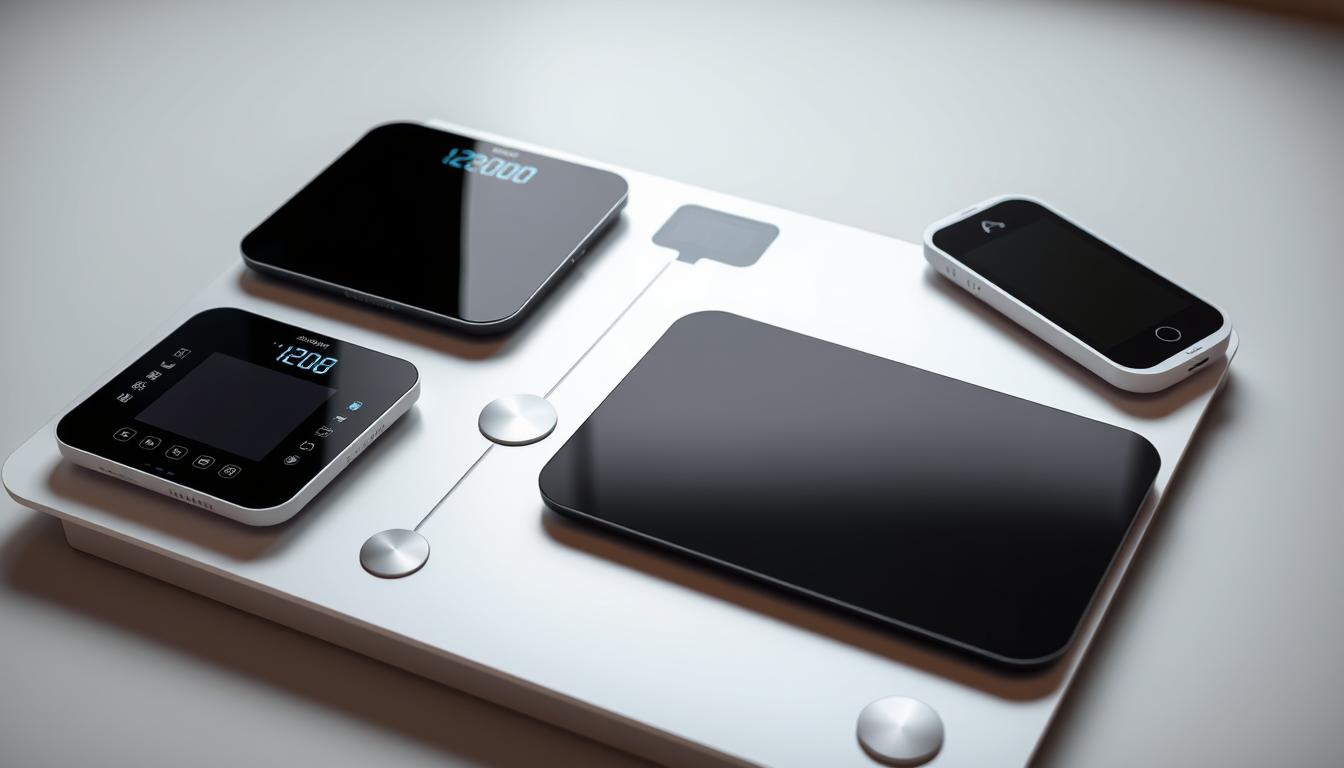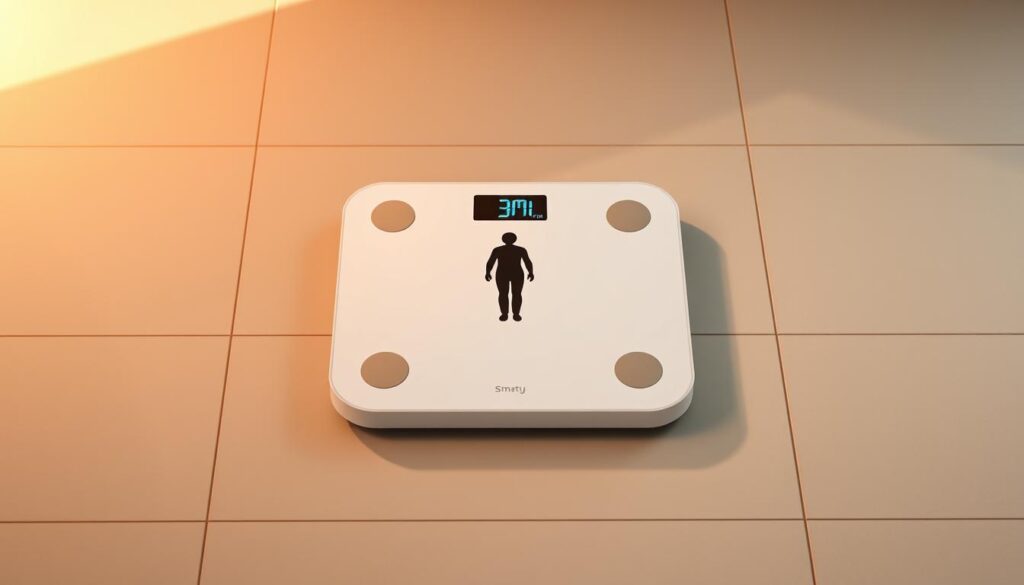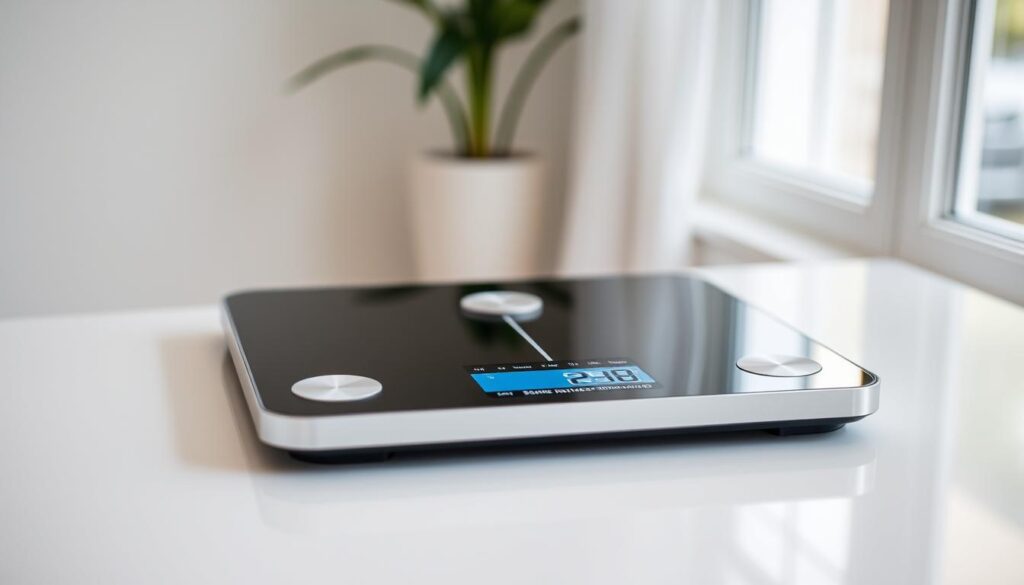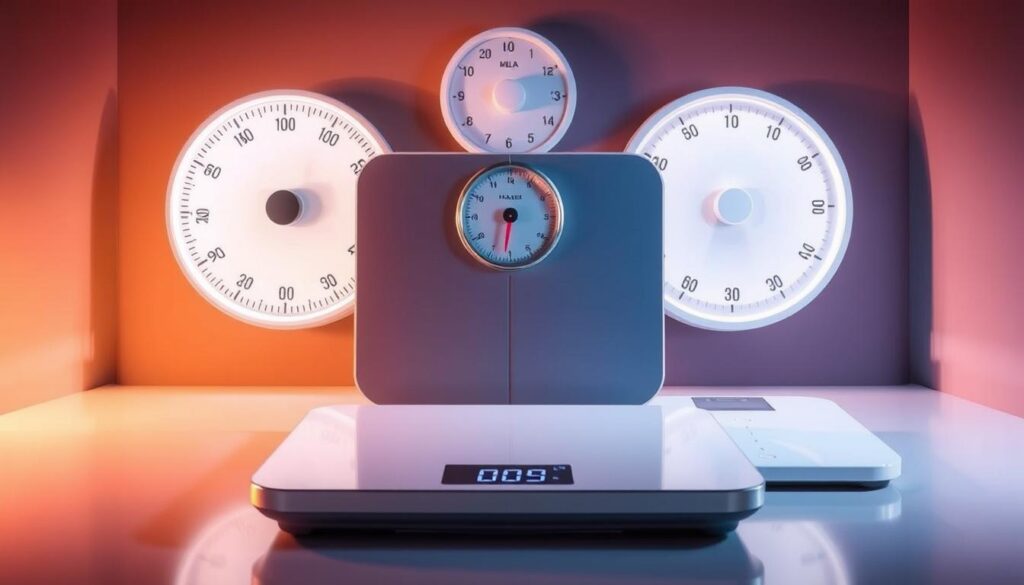Keeping a healthy weight and body shape is key for feeling good. With so many top BMI scales out there, picking the right one can be tough.
We’ll show you what to look for in the best BMI scales. We’ll also give you a rundown of the top models.
As we dive into body fat monitoring, we’ll look at different scales and their special features. This will help you make a smart choice.
Key Takeaways
- Understanding the importance of accurate body fat monitoring
- Key features to look for in top BMI scales
- Overview of the best BMI scales available in 2024
- How to choose the right scale for your health and fitness needs
- Tips for getting the most out of your body fat monitor
Understanding BMI: Why It Matters
Understanding and monitoring our BMI is key to a healthier lifestyle. BMI, or Body Mass Index, helps us see if our weight is healthy for our height.
What Is BMI?
BMI is found by dividing your weight in kilograms by your height in meters squared (kg/m^2). This simple formula gives a general idea of your weight health. Smart scales for BMI make it easy to track this regularly.
For adults, BMI ranges from underweight to obese. It’s a simple way to check your weight health.
The Importance of Monitoring BMI
Monitoring BMI is vital for good health. It’s a simple weight management tool that shows health risks. Being overweight or underweight can lead to diseases like diabetes and heart disease.
Tracking BMI helps make better lifestyle choices. It promotes a balanced diet and exercise, essential for health.
How BMI Is Used in Health Assessments
Healthcare professionals use BMI in health checks. It gives a quick health snapshot and spots issues early. BMI scale reviews stress the need for accurate BMI measurements.
Here’s a simple table showing BMI categories and health risks:
| BMI Category | BMI Range | Health Risk |
|---|---|---|
| Underweight | Less than 18.5 | Malnutrition, osteoporosis |
| Normal weight | 18.5 – 24.9 | Low risk |
| Overweight | 25 – 29.9 | Moderate risk of heart disease, diabetes |
| Obese | 30 or greater | High risk of heart disease, diabetes, certain cancers |
By understanding and monitoring our BMI, we can lead a healthier life. Using smart scales for BMI and other weight management tools helps us make positive changes.
Key Features to Look for in BMI Scales
When picking a BMI scale, look for key features that boost your health tracking. A good scale should give accurate measurements and track more than just BMI.
Accuracy and Precision
The accuracy of a BMI scale is key. Choose scales with bioelectrical impedance analysis (BIA) for precise body fat and muscle mass readings. Health.com reviews some top scales known for their accuracy.
Data Storage and Tracking
A good scale should store data for many users and track progress. This is great for families or anyone tracking their health. Scales that connect to your phone or computer are best for easy tracking. Look for Wi-Fi or Bluetooth connectivity.
Additional Health Metrics
Modern scales measure more than BMI. They can track body fat percentage, muscle mass, bone density, and heart rate. This gives a full view of your health. For example, body composition analyzers help you plan your fitness and diet better.
Here are some key features to look for in a BMI scale:
- High accuracy and precision
- Ability to store data for multiple users
- Connectivity options like Wi-Fi or Bluetooth
- Measurement of additional health metrics beyond BMI
- User-friendly interface and mobile app compatibility
By focusing on these features, you can find a BMI scale that meets your needs. It will help you track and manage your health better.
Top 5 BMI Scales of 2024
Looking at the best BMI scales of 2024, we see that accuracy and ease of use are key. With so many options, picking the right one can be tough. We’ll look at the top 5 BMI scales of 2024, comparing their features, prices, and user reviews to guide your choice.
Eon Core Smart Body Scale
The Eon Core Smart Body Scale is a top pick for 2024. It’s known for high accuracy and a stylish design. It measures BMI, body fat, and muscle mass. Users love its ease of use and detailed data analysis through its app.
- Tracks BMI, body fat, and muscle mass
- Syncs with popular health apps
- Highly rated for accuracy
Fitbit Aria Air Smart Scale
The Fitbit Aria Air Smart Scale is also a favorite. It’s known for seamless integration with Fitbit devices and apps. It gives accurate weight and BMI measurements and fits well in small spaces.
- Easy integration with Fitbit ecosystem
- Accurate weight and BMI tracking
- Compact and modern design
Withings Body+
The Withings Body+ is a high-end BMI scale. It offers detailed body composition analysis. It tracks BMI, body fat, and water percentage. Users like its detailed insights and Wi-Fi connectivity for easy syncing.
- Advanced body composition analysis
- Wi-Fi connectivity for seamless syncing
- Detailed health insights
Garmin Index S2 Smart Scale
The Garmin Index S2 Smart Scale is for those in the Garmin ecosystem. It tracks BMI, body fat, and muscle mass. Users praise its high accuracy and syncing with Garmin devices.
- Comprehensive health tracking
- High accuracy and reliability
- Syncs with Garmin devices
QardioBase2 Wireless Smart Scale
The QardioBase2 is known for its user-friendly interface and accurate measurements. It tracks BMI, weight, and body composition. Its Wi-Fi and Bluetooth ensure easy data transfer to smartphones.
- User-friendly interface
- Accurate measurements
- Wi-Fi and Bluetooth connectivity
When comparing these top BMI scales, accuracy, health metrics, and compatibility are key. The infographic above shows a visual comparison of these scales, highlighting their features and prices.
Comparison of Best BMI Scales
It’s important to compare the top BMI scales. Look at their features, prices, and what users say. This will help you see what each model is good at and what it might lack.
Price Range Comparison
BMI scales cost a lot or a little, depending on what they can do. Here’s a quick look:
- Basic BMI Scales: $10-$30
- Mid-range BMI Scales: $30-$60
- Advanced BMI Scales: $60-$150
Think about how much you want to spend and what you need from a scale.
Feature Checklist
Each BMI scale has its own set of features. Here’s a list of common ones to consider:
| Feature | Basic | Mid-range | Advanced |
|---|---|---|---|
| Accuracy | ±0.1 kg | ±0.1 kg | ±0.1 kg |
| Data Storage | Single user | Multiple users | Multiple users + app sync |
| Additional Metrics | BMI only | BMI, body fat | BMI, body fat, muscle mass, water percentage |
User Ratings and Reviews
User reviews are very helpful. They tell you how well a scale works and how easy it is to use. Here are some key points:
- Accuracy and Reliability: People like scales that stay accurate over time.
- Ease of Use: Simple, easy-to-use scales get good reviews.
- Additional Features: Features like app connectivity and support for many users are a hit.
Looking at user reviews helps you see how a scale really performs.
How to Calibrate Your BMI Scale
Calibration is a simple yet essential step in using your BMI scale effectively. Ensuring that your scale is accurately calibrated will provide you with reliable data for tracking your body mass index and other health metrics.
Step-by-Step Calibration Guide
To calibrate your BMI scale, follow these steps:
- Initial Setup: Place the scale on a flat, stable surface. Ensure it’s away from any objects that could interfere with its operation.
- Reset the Scale: If your scale has a reset button, press it to restore the scale to its default settings.
- Calibration Mode: Check your scale’s manual to see if it has a calibration mode. Some scales require you to enter this mode to begin calibration.
- Known Weight: Use a known weight (e.g., a calibration weight or a heavy object with a known mass) to calibrate the scale. Place the weight on the scale and adjust it according to the manufacturer’s instructions until it reads the correct weight.
- Verify: Once calibrated, verify the scale’s accuracy by weighing yourself or using the known weight again.
Common Calibration Mistakes
When calibrating your BMI scale, avoid the following common mistakes:
- Inconsistent Surfaces: Calibrating on uneven or soft surfaces can lead to inaccurate readings.
- Ignoring the Manual: Not following the manufacturer’s calibration instructions can result in incorrect calibration.
- Using Incorrect Weights: Using weights that are not certified or are of unknown mass can compromise the calibration.
When to Recalibrate
You should recalibrate your BMI scale in the following situations:
- After Moving: If you’ve moved the scale to a different location, recalibrate it to adjust for any changes in the surface or environment.
- Battery Replacement: Some scales may require recalibration after replacing the batteries.
- Inconsistent Readings: If you notice inconsistent readings or significant changes in your weight without a corresponding change in your body, it may be time to recalibrate.
| Calibration Step | Description | Importance |
|---|---|---|
| Initial Setup | Place scale on a flat surface | High |
| Reset the Scale | Restore scale to default settings | Medium |
| Calibration Mode | Enter calibration mode as per manual | High |
| Known Weight | Use a known weight to adjust scale | High |
| Verify | Check scale’s accuracy after calibration | High |
Maintaining Your BMI Scale for Longevity
Proper care and maintenance of your BMI scale can make it last longer. To get the most out of your device, follow a few simple guidelines.
Cleaning and Care Tips
Keeping your BMI scale clean is key for both hygiene and accuracy. Wipe it down with a soft, dry cloth after each use to stop dust and moisture buildup. For deeper cleaning, a slightly damp cloth is okay, but dry it well afterward to avoid damage.
Key Cleaning Tips:
- Avoid harsh chemicals or abrasive cleaners that can harm the scale’s surface.
- Regularly clean the electrodes for accurate readings.
- Use a soft brush to gently remove debris from the scale’s crevices.
Battery Maintenance
Battery care is vital for your BMI scale’s longevity. Check the battery level often and replace it when needed. Using high-quality batteries ensures consistent performance.
Battery Care Checklist:
| Task | Frequency | Notes |
|---|---|---|
| Check battery level | Monthly | Replace batteries when level is low |
| Clean battery contacts | Quarterly | Use a dry cloth to remove corrosion |
| Replace batteries | As needed | Use high-quality batteries |
Storage Recommendations
Proper storage of your BMI scale when not in use is important. Store it in a dry, cool place, away from sunlight and moisture. Avoid humid places like bathrooms to prevent damage.
“A well-maintained BMI scale is a valuable tool for tracking health and fitness goals. By following simple care and maintenance guidelines, you can ensure your scale remains accurate and functional for years to come.”
By following these maintenance tips, you can enjoy reliable and accurate readings from your BMI scale. It will be a valuable companion on your health journey.
Affordability: Budget-Friendly BMI Scales
Finding the right BMI scale doesn’t have to cost a lot. There are many affordable choices out there. It’s important to look at the price, features, and how accurate it is. We’ll look at the best budget-friendly BMI scales, from under $50 to premium models.
Best Options Under $50
If you’re on a tight budget, there are BMI scales under $50. They might not have all the features, but they’re reliable for tracking your BMI.
Some top picks include:
- Etekcity Digital Body Weight Scale
- Omron HN-286 Digital Body Weight Scale
- Greater Goods Digital Body Weight Scale
These scales are affordable and give accurate weight measurements. They’re also easy to use.
Best Mid-Range Choices
Mid-range BMI scales cost between $50 and $100. They offer a good mix of affordability and features. They often track body fat percentage and muscle mass.
Some of the best mid-range choices are:
- Withings Body+ Digital Body Composition Scale
- Fitbit Aria Air Digital Body Weight Scale
- QardioBase2 Digital Body Composition Scale
These scales have advanced health tracking features without being too pricey.
Premium Models Worth The Investment
If you’re ready to spend more, premium BMI scales offer advanced features. They include detailed body composition analysis, Wi-Fi connectivity, and app integration.
Some premium models worth considering are:
- Fitbit Aria 2 Digital Body Composition Scale
- Withings Body Comp Digital Body Composition Scale
- Eufy Smart Scale P1 Digital Body Composition Scale
These premium scales give comprehensive health insights. They’re perfect for those serious about health tracking.
To visualize the best budget-friendly options and their features, here’s an infographic:
Conclusion: Choosing the Right BMI Scale for You
When looking at BMI scales, it’s not just about weight. The best ones in 2024 help us understand our overall health. Now, with smart scales, we can track more than just weight. We can see body fat percentage and muscle mass too.
Key Takeaways
We’ve talked about what makes a good BMI scale. Look for accuracy, data storage, and health metrics. The best scales give a full picture of our health, helping us reach our fitness goals.
Smart Choices
Think about what you need in a BMI scale. Consider ease of use, phone compatibility, and the data you want to track. A good smart scale is a smart investment for a healthier life.
What’s Next
Future BMI scales will be even more advanced. They’ll be more accurate and track things like hydration and metabolic rate. Keeping up with these updates can help you stay on track with your health and fitness goals.




